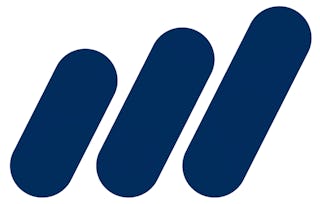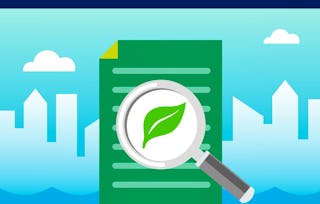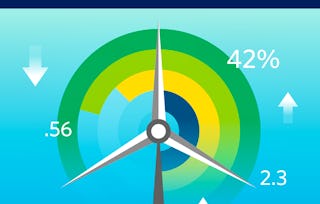In this course, you will focus on understanding climate change and the risks and opportunities that it creates for businesses in the 21st century. You will analyze the current impacts of climate change on a global scale, and the investment shifts that are required to achieve a net-zero economy. Next, you will analyze the role of climate disclosures and their importance in ESG.

ESG and Climate Change
3 days left! Gain next-level skills with Coursera Plus for $199 (regularly $399). Save now.

ESG and Climate Change
This course is part of The Materiality of ESG Factors Specialization

Instructor: Sarah Light
18,729 already enrolled
Included with
(455 reviews)
Skills you'll gain
- Climate Change Adaptation
- Waste Minimization
- Insurance
- Climate Change Mitigation
- Business Risk Management
- Sustainability Reporting
- Environmental Management Systems
- Corporate Sustainability
- Product Lifecycle Management
- Environmental Regulations
- Stakeholder Engagement
- Environmental Social And Corporate Governance (ESG)
Details to know

Add to your LinkedIn profile
8 assignments
See how employees at top companies are mastering in-demand skills

Build your subject-matter expertise
- Learn new concepts from industry experts
- Gain a foundational understanding of a subject or tool
- Develop job-relevant skills with hands-on projects
- Earn a shareable career certificate

There are 4 modules in this course
In this module, you will focus on understanding climate change and the risks and opportunities that it creates for businesses in the 21st century. You will analyze the current impacts of climate change on a global scale, and the investment shifts that are required to achieve a zero-carbon economy. Next, you will examine the stakeholders that are driving business firms to address climate change. You will learn how both the physical and financial stability risks that are imposed by more frequent natural disasters can affect business firms and the global economy. By the end of this module, you will have a detailed overview of the financial impacts of climate change, the ways that governments are addressing climate change, and the financial risks that unmitigated climate change is creating.
What's included
4 videos1 reading2 assignments
In this module, you will take an in-depth look at public environmental law and the distinct eras that have shaped modern-day climate policy. You will also review private environmental governance, examining the active role that private companies are playing in combating climate change as well as the parallels between the public and private sectors. Next, you will analyze the role of climate disclosures: what they require and their importance in ESG. By the end of this module, you will be able to differentiate between public and private environmental governance and their objectives, identify the three eras of public environmental law, and distinguish the role and goals of climate disclosures.
What's included
4 videos1 reading2 assignments
In this module, you will examine ecosystem services and the various methods used to promote climate resilience. You will review the ways in which public law addresses wildlife and habitat conservation and identify the limitations in meeting the demands of conservation efforts, especially when quick action is required to address disasters. Lastly, you will assess the insurance industry and the ways that it spreads risk, as well as creative ways that insurance as a form of private or public governance can build climate resilience. By the end of this module, you will have had a critical look at the different methods of building climate resilience, minimizing the impact of climate change through nature-based solutions, and two primary methods of insurance that can spread risk. You will understand the ways that private insurance can protect ecosystem services, and you will have identified innovative ways that business leaders can view climate solutions.
What's included
4 videos1 reading2 assignments
In this module, you will learn about the idea of promoting a circular economy through better stewardship of resources and waste management. You will analyze the waste and recycling streams in the United States and the effects that they have on the environment. You will also examine the challenges with recycling programs worldwide. Next, you will evaluate product stewardship, and the key players in that lifecycle, and will learn to differentiate between product stewardship and extended producer responsibility. Lastly, you will review the concept of greenwashing: what is driving firms to make exaggerated environmental claims, why it is harmful, and examples of enforcement actions. By the end of this module, you will have assessed the importance of product stewardship, reviewed some of the limits on green marketing, and analyzed increasing regulatory action.
What's included
5 videos1 reading2 assignments
Earn a career certificate
Add this credential to your LinkedIn profile, resume, or CV. Share it on social media and in your performance review.
Instructor

Offered by
Explore more from Business Strategy
 Status: Free Trial
Status: Free TrialCorporate Finance Institute
 Status: Free Trial
Status: Free TrialDuke University
 Status: Free Trial
Status: Free TrialUniversity of Pennsylvania
 Status: Free Trial
Status: Free TrialUniversity of Pennsylvania
Why people choose Coursera for their career

Felipe M.

Jennifer J.

Larry W.

Chaitanya A.
Learner reviews
- 5 stars
82.63%
- 4 stars
15.38%
- 3 stars
0.87%
- 2 stars
0.43%
- 1 star
0.65%
Showing 3 of 455
Reviewed on Nov 22, 2022
The content of the course was appropriate and made sense. In addition, kudos to the instructor for making it engaging and meaningful.
Reviewed on Jul 26, 2024
Excellent Course, touched on the most important aspect of the subject, Prof. Sarah Light did justice to it. Well done
Reviewed on Jul 13, 2022
Great Content. Everything there's to know about Climate Change, Sustainability, Green Legal Governance and Circular Economy. Expert Lecturer.

Open new doors with Coursera Plus
Unlimited access to 10,000+ world-class courses, hands-on projects, and job-ready certificate programs - all included in your subscription
Advance your career with an online degree
Earn a degree from world-class universities - 100% online
Join over 3,400 global companies that choose Coursera for Business
Upskill your employees to excel in the digital economy
Frequently asked questions
To access the course materials, assignments and to earn a Certificate, you will need to purchase the Certificate experience when you enroll in a course. You can try a Free Trial instead, or apply for Financial Aid. The course may offer 'Full Course, No Certificate' instead. This option lets you see all course materials, submit required assessments, and get a final grade. This also means that you will not be able to purchase a Certificate experience.
When you enroll in the course, you get access to all of the courses in the Specialization, and you earn a certificate when you complete the work. Your electronic Certificate will be added to your Accomplishments page - from there, you can print your Certificate or add it to your LinkedIn profile.
Yes. In select learning programs, you can apply for financial aid or a scholarship if you can’t afford the enrollment fee. If fin aid or scholarship is available for your learning program selection, you’ll find a link to apply on the description page.
More questions
Financial aid available,

